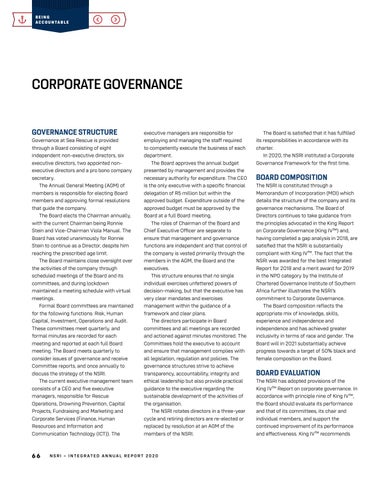BEING A C C O U N TA B L E
CORPORATE GOVERNANCE GOVERNANCE STRUCTURE Governance at Sea Rescue is provided through a Board consisting of eight independent non-executive directors, six executive directors, two appointed nonexecutive directors and a pro bono company secretary. The Annual General Meeting (AGM) of members is responsible for electing Board members and approving formal resolutions that guide the company. The Board elects the Chairman annually, with the current Chairman being Ronnie Stein and Vice-Chairman Viola Manual. The Board has voted unanimously for Ronnie Stein to continue as a Director, despite him reaching the prescribed age limit. The Board maintains close oversight over the activities of the company through scheduled meetings of the Board and its committees, and during lockdown maintained a meeting schedule with virtual meetings. Formal Board committees are maintained for the following functions: Risk, Human Capital, Investment, Operations and Audit. These committees meet quarterly, and formal minutes are recorded for each meeting and reported at each full Board meeting. The Board meets quarterly to consider issues of governance and receive Committee reports, and once annually to discuss the strategy of the NSRI. The current executive management team consists of a CEO and five executive managers, responsible for Rescue Operations, Drowning Prevention, Capital Projects, Fundraising and Marketing and Corporate Services (Finance, Human Resources and Information and Communication Technology (ICT)). The
66
executive managers are responsible for employing and managing the staff required to competently execute the business of each department. The Board approves the annual budget presented by management and provides the necessary authority for expenditure. The CEO is the only executive with a specific financial delegation of R5 million but within the approved budget. Expenditure outside of the approved budget must be approved by the Board at a full Board meeting. The roles of Chairman of the Board and Chief Executive Officer are separate to ensure that management and governance functions are independent and that control of the company is vested primarily through the members in the AGM, the Board and the executives. This structure ensures that no single individual exercises unfettered powers of decision-making, but that the executive has very clear mandates and exercises management within the guidance of a framework and clear plans. The directors participate in Board committees and all meetings are recorded and actioned against minutes monitored. The Committees hold the executive to account and ensure that management complies with all legislation, regulation and policies. The governance structures strive to achieve transparency, accountability, integrity and ethical leadership but also provide practical guidance to the executive regarding the sustainable development of the activities of the organisation. The NSRI rotates directors in a three-year cycle and retiring directors are re-elected or replaced by resolution at an AGM of the members of the NSRI.
N S R I – I N T E G R AT E D A N N U A L R E P O R T 2 0 2 0
The Board is satisfied that it has fulfilled its responsibilities in accordance with its charter. In 2020, the NSRI instituted a Corporate Governance Framework for the first time.
BOARD COMPOSITION The NSRI is constituted through a Memorandum of Incorporation (MOI) which details the structure of the company and its governance mechanisms. The Board of Directors continues to take guidance from the principles advocated in the King Report on Corporate Governance (King IVTM) and, having completed a gap analysis in 2018, are satisfied that the NSRI is substantially compliant with King IVTM. The fact that the NSRI was awarded for the best Integrated Report for 2018 and a merit award for 2019 in the NPO category by the Institute of Chartered Governance Institute of Southern Africa further illustrates the NSRI’s commitment to Corporate Governance. The Board composition reflects the appropriate mix of knowledge, skills, experience and independence and independence and has achieved greater inclusivity in terms of race and gender. The Board will in 2021 substantially achieve progress towards a target of 50% black and female composition on the Board.
BOARD EVALUATION The NSRI has adopted provisions of the King IVTM Report on corporate governance. In accordance with principle nine of King IVTM, the Board should evaluate its performance and that of its committees, its chair and individual members, and support the continued improvement of its performance and effectiveness. King IVTM recommends












